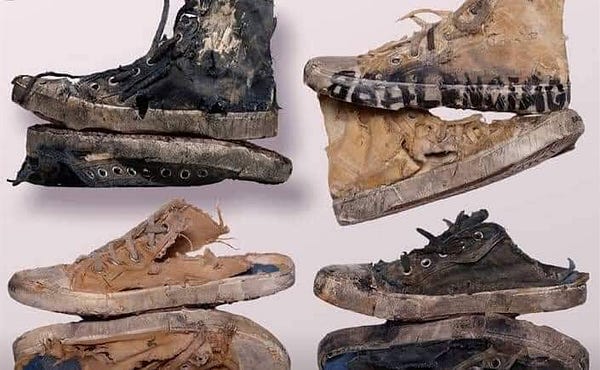The Balenciaga Joke: Is the Anti-Fashion Brand Laughing at Us?
The Balenciaga Trash Pouch is a new fad that has sparked ... “High fashion is a joke”
How does fashion reflect our society?
Every generation, there's a new look. Fashion reflects how we live, and the idea of freedom of expression has been almost literal. Clothing is an outward representation of how we want others to see us, but it also shows how we view ourselves on an inward level. Celebrities and models, considered icons in fashion as well as beauty and culture overall, typically dictate our perception of what's in style. There have been countless times when celebrities have changed their looks overnight, or trends like high-waisted jeans or even athleisure have emerged and quickly gone out of style. For example, thanks to Instagram, Vetements (co-founded by Demna )was nominated for its first CFDA award. However, many thought that Vetements was overrated because of it being so popular on social media, especially among teenagers. So what's going on with streetwear? I'm not sure why everyone loves this so much. Yet despite the backlash from some people who don't get Vetements' appeal, Kanye West designed two shirts with the brand for his Yeezy Season 4 show at New York Fashion Week. And he just announced that he'll be doing another line with them. So does that mean you're not allowed to make fun of/with them anymore?
How Demna Gvasalia's Balenciaga defined the aesthetic of a generation.
Balenciaga is a luxury fashion house founded in 1917 by the Spaniard designer Cristóbal Balenciaga. Marketers may not have been so important to him since he designed for luxury brands - but all fashion houses know that marketing themselves appropriately will keep customers returning.
There's no denying that the mystery shrouding mega-designer Demna Gvasalia's fashion label Balenciaga has been wildly effective at generating buzz, especially on social media. But does it have staying power? After all, Balenciaga has been called anti-fashion and an inside joke by some critics.
When Demna joined Balenciaga in 2015, he did so with a vision for clothing that would feel new and refreshing. He wanted to honor the legacy of his predecessor while also giving the nod to what's happening now. Yet, at the same time, he wanted these clothes to be timeless, something you could wear today and fifty years from now would still look good on you because he never wanted anyone wearing his designs to worry about whether they looked outdated or silly due to their fashion sense.
He had a similar vision at Vetements, too, where his famous DHL t-shirt was sold out weeks after it was first seen on the Paris runway.
Balenciaga on Social Media
In 2021, Balenciaga's marketing left behind platforms like Instagram by deleting all their posts. Many people were curious about why the brand would do this, but then a new campaign was launched with 10 different celebrity faces, including Justin Bieber. Most people were stunned to see him because he wore an outfit that stood out from what he usually wears - which drew a lot of attention.
"I think social media is boring, and dangerously addictive for some, as well as super manipulative," said Demna in a Vogue interview after a show where he used state-of-the-art technology to create deep-fake clones of his most famous model, Eliza Douglas. Every model that walked the runway was cloned with her face plastered onto them, wearing their own version of one of his trademark designs from the house.
There are many different ways to get people online amped up, but one sure way always works- selling something strange at an exorbitant price. That's precisely what Balenciaga designer Demna Gvasalia has done with selling the' most expensive trash bag in the world.'
The brand appears to mock us with its audacity, and we seem to love it, albeit somewhat reluctantly. As an artistic director, Gvasalia has transformed the brand into a modern aesthetic for Generation Z that is layered with irony and humor. In particular, Gvasalia relies on streetwear trends to make statements about our culture without being too serious or relying on luxury. He also tries to keep prices accessible so customers can buy his clothes.
$2,290 'destroyed' sneakers
If you were to ask me if this is an entirely practical design, I would say no. However, I will argue that in some ways it is - much like a swimsuit has its merits even though it doesn't cover your entire body. It makes perfect sense to wear a turtleneck or high-necked shirt under this because it's not like your clothes will get any cleaner than they already are. And if you're not convinced, just know that on eBay, these will go for about double the retail price because people like dressing up their hobo chic outfits with designer accessories.
According to the brand, the Paris sneaker is "a retooled classic design which interprets mid-century athleticism and timeless casual wear in black, white, or red, with a white rubber sole and toe with distressed canvas and rough edges, affecting a pre-worn look."





Balenciaga selling' most expensive trash bag in the world.'
The fashion house is facing another criticism for its recent bag that retails for $2,145. For those wondering what such a pricey accessory looks like, it is a cotton duffle bag with designer logos emblazoned on the side. Critics argue that such an expensive bag is exorbitant and not justifiable by function. The functional purpose of this bag seems nonexistent, which begs the question: are we being played as fools? But it's ok because rich people can afford luxuries, right? As long as they're buying something nobody else can get, it doesn't matter how much money they're spending! When their kids go to school, they'll have no problem fitting in because everyone will know how wealthy their parents are! And if you still don't believe that these bags exist only for show and not utility, Balenciaga has got your back. Their press release says that some might say this bag was made with streetwear in mind. They also claim to understand why people might think these bags were made without any practical use in mind (why would anyone spend 2 grand on something so mundane?). In fact, the company said they anticipated backlash from customers over the price point when releasing this product.
Balenciaga: A Joke?
When Balenciaga started, the runway was his to take, well known for its avant-garde and progressive takes on fashion that blurs the line between what's fashionable and futuristic, making it one of today's most influential brands.
The modern Balenciaga is not fashion; it's anti-fashion. Fashion is supposed to make us feel better about ourselves like we can be more fabulous and cool. When you think of a fashion designer's job, they want their clothes to make us look better, not worse. For example, Karl Lagerfeld said his goal was to make people smile with what they wore. But people were less than amused by Balenciaga when all of the models sported identical bodysuits on their runway - masks covering their faces, tufts of hair peeking out from underneath the headpiece. Individuality was suffocated by pursuing lucre; all were slaves to work and fashion. Each model, a living, breathing example of this pulsating metropolis. It's an approach that would have made even Dolce & Gabbana blush; Alessandro Michele used strategically placed paneling in his designs so that some semblance of modesty remained intact.
And while the internet might laugh, Demna and its shareholders are certainly laughing harder.
Regarding sustainability, Balenciaga is owned by Kering, and according to Good on You Directory, it has good policies to reduce its greenhouse gas emissions in its supply chain.
Balenciaga holds a good environmental rating and is committed to reducing the impact of climate change. In addition, Balenciaga makes an effort to use eco-friendly materials while also investing in research towards sustainable practices. Furthermore, Balenciaga has taken steps within its operation to keep the earth healthy by reducing greenhouse gas emissions and toxic chemicals used in the leather tanning process.
As for labor standards, Balenciaga falls short as there are several reports of unfair working conditions at factories producing products on behalf of Balenciaga. However, despite these failings, Balenciaga earns credit points due to acknowledging that something needs to be done about issues affecting society and providing policies that may mitigate such effects from happening again in future generations.


Vera
I really hope you're enjoying The Sustainability Pulse, my weekly newsletter looking at sustainability in the fashion industry. If you find the tips and insights useful, please share these articles to help spread the word.
Anyone can subscribe for free here.
Please feel free to follow me on twitter or LinkedIn if you want to discuss anything sustainability-related!











